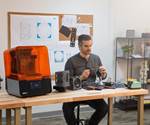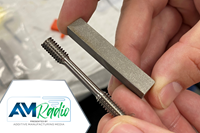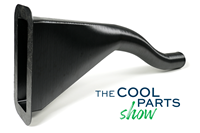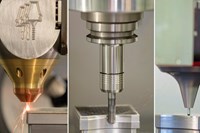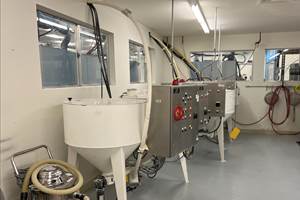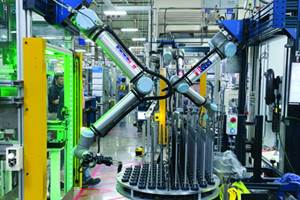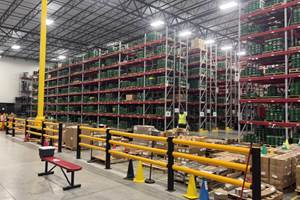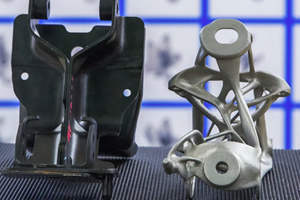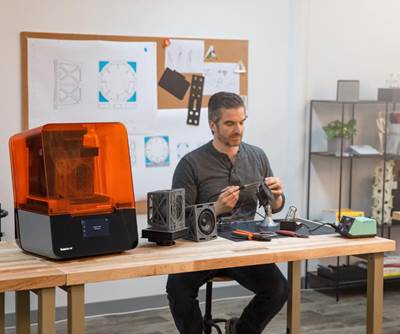'10 Things We’re Seeing in Machine Shops Right Now'
Metalworking shops and plastics plants make for interesting comparisons of their responses to the COVID-19 challenge.
That’s the title of a blog recently posted by Peter Zelinski, Chief Editor of Modern Machine Shop on the “Gardner Grapevine,” an internal newsletter of Gardner Business Media, which also publishes Plastics Technology. I’m glad he shared that, because I think you’ll find his assessment of metalworking shops’ responses to the challenges of the global pandemic to be not that different from what’s happening in plastics plants today. Here are his key points, so you can compare for yourself:
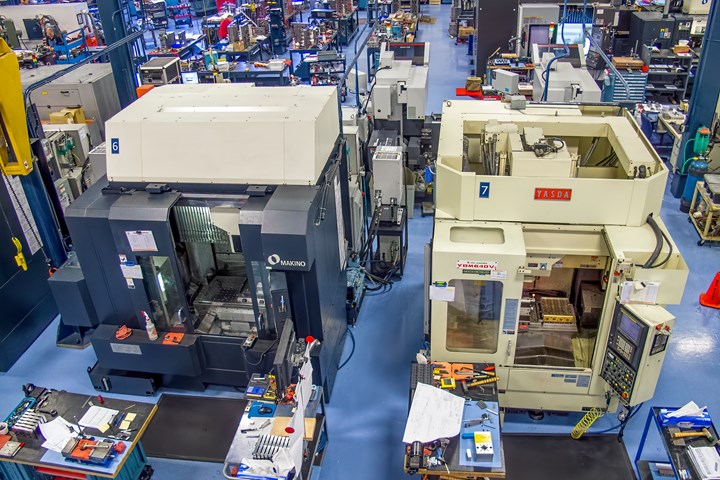
How metalworking shops are responding to COVID-19 challenges are not that different from the strategies of plastics plants.
1. General impression: Doing OK. “Cautious optimism” is the tone with which most machine shops describe current business and future prospects. For many, the coronavirus did not disrupt their work as much as they feared. Some customer orders continued with barely any interruption. (For some plastics plants, new business directly related to COVID-19 replaced or supplemented other business.) Still, the view ahead is clouded and gives some metal shops pause.
2. Lights-out is best opportunity for new capacity. A shop that expands—as some plastics plants definitely are doing—will have a hard (or impossible) time doing so by staffing an additional shift. “The better option—and increasingly the winning option,” says Zelinski, “is equipment and systems allowing shops to keep producing into the night hours with zero employees present.” That sounds about right. Smart machines and smart factories—mechanical automation and digital automation (of the flow of data between machines and MES or ERP systems)—are looking more and more like opportunities that cannot be ignored or delayed.
3. Shops want robots—if they are versatile. “Robots are unattractive if they have to be dedicated to a job, because the mix of work is now changing too rapidly for this to make sense,” Zelinski notes. “But robots that are easy to redeploy are attractive.” Flexible automation is the catch phrase I keep hearing. In fact, flexible everything is what I’m hearing all over. Collaborative robots or “cobots” are taking industry by storm precisely because they are so easy to program and useful in so wide a range of tasks.
4. Attention to ERP. To me, that’s an extension of trend #2, under the category of “smart factories,” otherwise known as Industry 4.0. No doubt about it, more and more plastics processors we talk to are implementing ERP and MES systems to automate the information flow, eliminate waste and delays and errors from manual data input. Knowing exactly what’s going on at every machine and department in the plant—in real time and from the office, plant floor or at home—is worth thousands of dollars per month to some processors. Managers no longer are daunted by the morning data dump of a huge printout of the previous day’s results. Customized dashboards distill only the most relevant data into a display on a computer, tablet or phone that can be understood at a glance—even at home before leaving for work.
5. Polymer 3D printing is on job shops’ wish lists. “Most machine shops now get it that they could probably benefit from 3D printing.” Plastics processors aren’t far behind, though using 3D printing for plastic production parts is a different proposition from the already widely accepted applications in prototypes and jigs and fixtures. Zelinski points out that machine shops not only know that some short-run work should be printed rather than machined, but also that some parts “need not be metal but can be polymer.” So, if even the metalworking shops “get it,” then plastics processors had better hustle to grab this opportunity while it’s ripe.
6. Metal 3D printing has an opening for captive use. Zelinski sees captive machine shops considering whether to enable 3D printing as another mode of production. Some plastics processors with in-house tooling capabilities are doing the same. Plastics tooling applications include repair parts and core/cavity inserts with conformal cooling or special cooling provisions like liquid CO2.
7. Investment in short-run capabilities may follow if business declines. “If things get tighter,” Zelinski sees machine shops actively considering investment in quick-change solutions that enable them to take on short-run and one-off work they might otherwise turn away. This relates, in part, to trend #5. We have reported on a handful of molders that already specialize in short-run, quick-turn work that other molders shy away from. They might get more competition if conditions get “tighter,” as Zelinski says. But that’s no easy row to hoe. Those agile short-run specialists got to where they are today by diligently honing their processes and procedures to maximize changeover efficiency, and by investing in ERP/MES and other digital capabilities that keep them light on their feet.
8. Cybersecurity/security in general. “Shops are under increasing requirements to keep customer information confidential and controlled.” That’s equally true, whether the “shops” are for metal or plastics. Attention to cybersecurity is certainly in order, as more and more technology vendors offer online “portals” and data-storage sites and even remote monitoring of production machinery for preventive maintenance.
9. Shop ownership is changing. In the metalworking field, Zelinski sees “new shop owners coming into our space” through retirements and acquisitions by other shops, investment groups and individual entrepreneurs. That has been happening in plastics for a while. Multi-plant operations are more and more common. So is empire building by private-equity firms and others. One new trend in metalworking, according to Zelinski, is the “one-man shop,” made possible by advanced technology. Don’t know if that’s in the cards for plastics, other than 3D printing.
10. Certification, marketing. “Machining businesses are catching up with other types of companies in terms of business development.” In the past, Zelinski says, his magazine’s metalworking readers “have been weak in this area—local or regional connections got them much of their work.” That’s always been a weakness of many independent (custom) plastics processors, too. “Now, machine shop owners are more likely to be serious marketers,” Zelinski observes. I’m not sure how true that is in plastics, but some processors are indeed making use of social media to raise their market profile. And some of them have been inclined to “build their brand” by renovating their plants or outfitting new spaces with ample lighting, new floor finishes and rigorous housekeeping to convey a “clean” look. I even encountered one entrepreneur who broke into the custom molding business by spending extra for premium-class equipment in order to suggest to prospective customers that his start-up was a “first-class” shop.
On a related topic, Zelinski says machine shops “are more likely to invest in certifications that give them credibility in markets they want to serve.” That’s a long-standing practice in plastics, where ISO 9001 and other quality standards are common—especially in automotive and other markets where industry-specific certifications are essential. More recently, the growth of medical plastics has been paralleled by increasing prevalence of ISO 13485 medical quality certifications.
Related Content
A Tour of The Stratasys Direct Manufacturing Facility
The company's Belton manufacturing site in Texas is growing to support its various 3D printing applications for mass production in industries such as automotive and aerospace.
Read MoreHow AM Enables Cobot Automation for Thyssenkrupp Bilstein (Includes Video)
The shock absorber maker has responded to its staffing shortages through extensive use of collaborative robots. In-house 3D printing makes this possible by providing the related hardware needed to complete the cobot-automated cells.
Read MoreDo Distributors Dream of Digital Inventory? Würth Additive Group Does
It’s more than a dream for Würth Additive Group and its parent company, in fact. Along with supplying additive equipment, the group is now developing solutions for sourcing 3D printed parts in a reliable, elastic digital inventory model.
Read MoreHow Additive Manufacturing Is Transforming EVs and Transportation: AM Radio #23
As 3D printing is adopted into the electric vehicle (EV) market, it is not just vehicles that are being reshaped. In this episode of the AM Radio podcast, we discuss additive manufacturing and the future of transportation.
Read MoreRead Next
How the Coronavirus Crisis Will Change Plastics Processing
Manufacturing as a whole will emerge stronger, more nimble and in a better position to capitalize on opportunities as a result of the COVID-19 pandemic.
Read More3D Printing Helps Keep Production Going During the Coronavirus Crisis
Formlabs and Essentium both discuss how their companies are responding to the COVID-19 crisis and how 3D printing can help eliminate potential supply chain disruption.
Read MoreCoronavirus and the U.S. Plastics Industry Supply Chain
While we cannot confirm today that the coronavirus has already impacted the U.S. plastics industry supply chain, it is reasonable to expect that if the coronavirus crisis in China continues and escalates, it will negatively impact the U.S. plastics industry. For business continuity reasons, U.S. plastics companies need to look at their current supply chain involving China and—as a precautionary measure—examine alternative supply sources.
Read More


